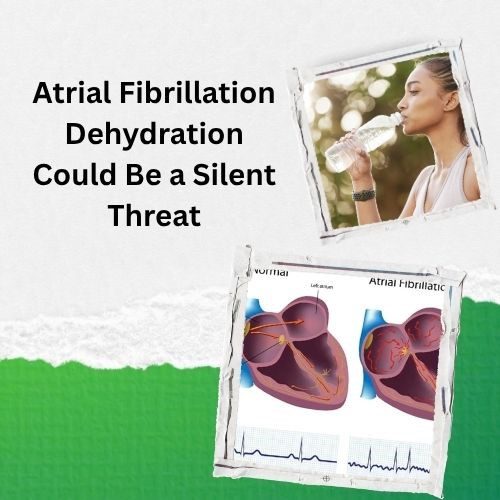When it comes to heart health, most people focus on cholesterol, blood pressure, or genetics. But there’s another hidden danger that can quietly disrupt your heartbeat — dehydration. Recent studies and cardiologists have warned that even mild dehydration can impact the heart’s rhythm, especially for people with or at risk of Atrial Fibrillation (AFib).
Atrial Fibrillation Dehydration is emerging as a silent threat that can trigger or worsen irregular heartbeats without any obvious warning signs. Doctors emphasize that proper hydration is not only essential for overall well-being but also a critical component of maintaining a stable heart rhythm.
In this comprehensive article, we’ll explore how dehydration affects the heart, the link between Atrial Fibrillation and dehydration, the Atrial Fibrillation Symptoms, Causes, Diagnosis, Treatment you need to watch for, prevention strategies, and expert recommendations.
Dehydration and Atrial Fibrillation
Atrial Fibrillation (AFib) is a type of arrhythmia — an irregular or rapid heartbeat — that occurs when the heart’s upper chambers (atria) beat out of sync with the lower chambers (ventricles). This can lead to poor blood flow, dizziness, fatigue, chest pain, and an increased risk of stroke.
Dehydration happens when the body loses more fluids than it takes in. While it might seem unrelated to heart rhythm, dehydration can cause changes in electrolyte levels, blood volume, and blood pressure — all of which can affect the heart’s electrical activity.
When your body is dehydrated, the concentration of electrolytes such as potassium, sodium, magnesium, and calcium becomes imbalanced. These electrolytes are vital for transmitting electrical impulses that control your heartbeat. Even small shifts can make your heart more prone to irregular rhythms, including Atrial Fibrillation.
Cardiologists warn that Atrial Fibrillation Dehydration can be a dangerous combination because dehydration puts extra stress on the cardiovascular system. For those already diagnosed with AFib, it can lead to sudden flare-ups or worsen existing episodes.
How Dehydration Affects the Heart
To understand the connection, it’s important to look at what dehydration does inside the body:
- Electrolyte Imbalance:
Electrolytes control the electrical signals in the heart. When dehydration disrupts this balance, the heart’s natural pacemaker — the sinoatrial node — can misfire, leading to irregular beats. - Reduced Blood Volume:
When you’re dehydrated, your blood volume decreases, meaning your heart must pump harder to circulate oxygen and nutrients. This added strain can disturb normal rhythm patterns. - Increased Heart Rate:
Dehydration makes the blood thicker and harder to pump, leading to a faster heartbeat. Over time, this stress may trigger AFib episodes. - Changes in Blood Pressure:
Dehydration can cause a sudden drop in blood pressure, which may confuse the heart’s electrical system and contribute to arrhythmias.
Doctors note that while dehydration alone may not always cause AFib, it can precipitate or aggravate it in susceptible individuals — such as older adults, athletes, or those taking diuretics or heart medications.
The Silent Nature of Atrial Fibrillation Dehydration
One reason this condition is called a “silent threat” is that dehydration often goes unnoticed. Many people mistake early signs — such as fatigue, mild dizziness, or palpitations — for simple tiredness or stress. However, these symptoms can be the body’s way of warning that it’s running low on essential fluids and electrolytes, which raises the question: Is Atrial Fibrillation going to get worse? Proper hydration and monitoring can help prevent the condition from escalating.
Furthermore, some AFib episodes occur without symptoms at all, meaning a person may be dehydrated and in an abnormal rhythm without realizing it. This combination increases the risk of blood clots, stroke, and heart failure over time.
Dr. Linda Baker, a cardiologist at Johns Hopkins Medicine, notes:
“Even slight dehydration can destabilize the heart’s rhythm in sensitive patients. Many AFib episodes we see in the ER are linked to fluid imbalance, especially during hot weather or after illness.”
Who Is Most at Risk?
Certain individuals are more vulnerable to the effects of Atrial Fibrillation Dehydration, including:
- Older adults – They have a reduced sense of thirst and slower kidney function.
- People with heart disease or AFib history – Their hearts are already prone to irregular rhythms.
- Those taking diuretics – These medications increase fluid loss through urine.
- Athletes – Intense sweating can lead to rapid dehydration and electrolyte loss.
- People with diabetes – High blood sugar can cause excessive urination, leading to dehydration.
- Individuals recovering from illness – Fever, vomiting, or diarrhea depletes body fluids quickly.
For these groups, staying hydrated is not just about comfort — it’s a medical necessity.
Can Dehydration Cause Atrial Fibrillation?
Many people ask, “Can dehydration cause Atrial Fibrillation?” or “Does dehydration cause Atrial Fibrillation?”
While dehydration alone might not directly cause AFib in healthy hearts, it can certainly trigger an episode in those predisposed to irregular rhythms. Medical experts agree that dehydration acts as a catalyst rather than the primary cause.
Here’s how:
- Dehydration alters blood chemistry and increases cardiac workload.
- It can disrupt electrolyte balance, especially potassium and magnesium, both essential for cardiac stability.
- For patients already living with AFib, even mild dehydration can make the condition flare up unexpectedly.
So, while the answer to “Can Atrial Fibrillation be caused by dehydration?” is yes in certain situations, the real danger lies in not recognizing the warning signs early enough.
Common Signs of Dehydration That May Affect the Heart
Recognizing dehydration early can help prevent heart rhythm disturbances. Watch for these key symptoms:
- Thirst or dry mouth
- Fatigue or weakness
- Headaches or lightheadedness
- Muscle cramps or twitching
- Dark yellow urine or infrequent urination
- Rapid or irregular heartbeat
- Confusion or irritability
If you have Atrial Fibrillation and notice palpitations along with these symptoms, it’s important to rehydrate immediately and, if symptoms persist, seek medical attention.
Medical Insights: What Doctors Say About Atrial Fibrillation Dehydration
Cardiologists stress that hydration management is a crucial yet often overlooked part of AFib treatment. In many cases, patients focus solely on medications like beta-blockers or anticoagulants, without realizing how fluid intake can influence outcomes.
Dr. Michael Chen, a heart rhythm specialist, explains:
“We see many patients admitted for AFib episodes after exercising, drinking alcohol, or recovering from a stomach bug. In all these cases, dehydration played a role. Managing hydration is one of the simplest and most effective preventive steps.”
Doctors also highlight that overhydration — drinking too much water — can be harmful, especially for patients with heart failure. The key is to maintain electrolyte balance and drink water consistently throughout the day and instead of in large quantities all at once. The combination of medication and Natural Treatment for Atrial Fibrillation can be a better option for the AFib patients.
Preventing Atrial Fibrillation Dehydration
Preventing this condition doesn’t require complex medical interventions — it mostly comes down to daily habits. Here’s what experts recommend:
Stay Consistently Hydrated
Aim to drink water steadily throughout the day rather than in bursts. Clear or light-yellow urine is a good indicator of adequate hydration.
Replenish Electrolytes
After sweating, exercising, or illness, replace lost electrolytes through oral rehydration solutions, coconut water, or balanced sports drinks. Avoid sugary beverages or energy drinks, which can worsen dehydration.
Limit Caffeine and Alcohol
Both caffeine and alcohol act as diuretics, increasing fluid loss. Moderate consumption is fine, but excessive intake can trigger AFib episodes.
Monitor Medications
Some medications, especially diuretics or antihypertensives, can increase fluid loss. Discuss hydration needs with your doctor if you’re on these drugs.
Be Cautious During Hot Weather
High temperatures accelerate fluid loss. Increase your water intake during summer or while spending time outdoors.
Balance Sodium Intake
Too much sodium can lead to water retention and high blood pressure, while too little may affect electrolyte balance. Aim for a moderate sodium level as advised by your healthcare provider.
Track Symptoms
If you feel palpitations, fatigue, or dizziness, check your hydration status. Keeping a log of fluid intake and symptoms can help identify triggers and guide the treatment of Atrial Fibrillation symptoms effectively.
Real-Life Case: When Dehydration Sparked AFib
Consider the case of John, a 62-year-old man with a history of mild AFib. After spending a long day gardening under the sun, he started feeling his heart race. He assumed it was exhaustion, but later, his smartwatch showed an irregular heartbeat. At the hospital, tests revealed he was moderately dehydrated, which had triggered his AFib episode.
After treatment with fluids and electrolyte correction, his heart rhythm normalized. His cardiologist advised him to track his water intake and avoid dehydration during outdoor activities. Since then, John hasn’t had another episode.
This real-world example shows how easily Atrial Fibrillation Dehydration can occur — and how preventable it often is, highlighting that with proper care and lifestyle changes, some people may even see improvements with Atrial Fibrillation cured naturally.
Lifestyle Adjustments for a Healthy Heart Rhythm
Maintaining hydration is part of a broader lifestyle strategy to prevent AFib flare-ups. Alongside proper fluid intake, consider these changes:
- Adopt a heart-healthy diet: Emphasize fruits, vegetables, whole grains, and lean proteins.
- Limit salt and processed foods: They can affect fluid balance.
- Exercise moderately: Stay active, but don’t overexert without proper hydration.
- Get adequate sleep: Poor sleep increases stress hormones, which may trigger arrhythmias.
- Manage stress: Techniques like meditation or deep breathing support steady heart rhythms.
- Avoid smoking: Nicotine constricts blood vessels and worsens heart rhythm issues.
These simple steps not only reduce AFib risk but also improve overall cardiovascular health.
When to Seek Medical Help
If you have a known history of AFib and experience symptoms like rapid heartbeat, shortness of breath, or chest discomfort — especially after sweating, illness, or not drinking enough water — seek medical attention and Atrial Fibrillation Herbal Supplement immediately.
Emergency care is critical if symptoms persist, as untreated Atrial Fibrillation can lead to blood clots and stroke.
Doctors may perform electrocardiograms (ECGs), blood tests, and electrolyte panels to determine if dehydration or other factors triggered your episode.
Key Takeaways
- Dehydration can trigger or worsen AFib episodes in sensitive individuals.
- Electrolyte imbalance plays a major role in heart rhythm disturbances.
- Older adults and heart patients are especially vulnerable.
- Consistent hydration and balanced electrolytes can prevent many AFib events.
- Recognize early warning signs such as palpitations, fatigue, or dizziness.
- Seek medical attention if symptoms persist to prevent complications.
Final Thought
Your heart works tirelessly every moment of your life — shouldn’t you give it the simplest care it needs? Hydration may seem small, but staying properly hydrated can protect your heart from silent threats like Atrial Fibrillation Dehydration.
Every sip counts. Make water your daily habit, listen to your body, and remember: a steady heartbeat starts with simple, consistent care. Take action today, and your heart will thank you tomorrow.




